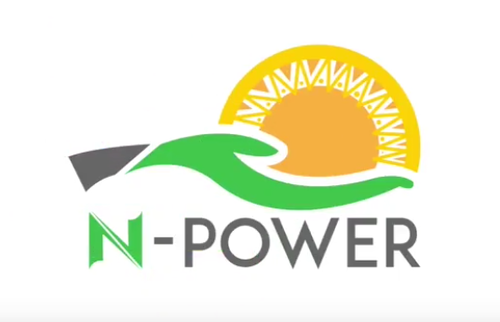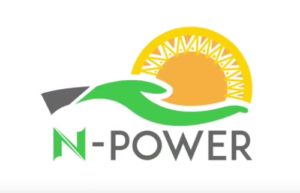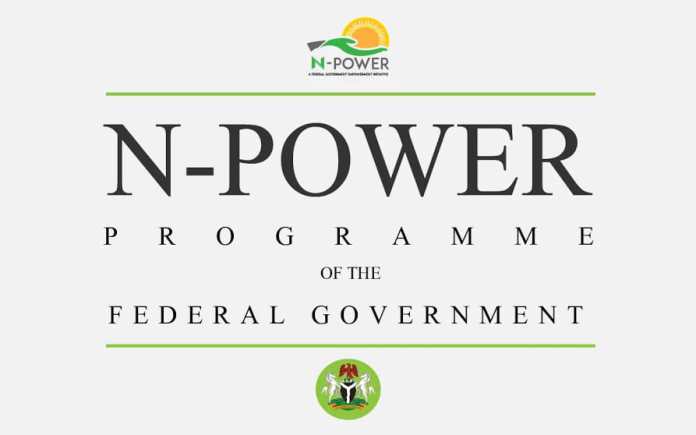Economy
N-Power: Beneficiaries To Undergo Physical Verification


By Modupe Gbadeyanka
Federal Government has disclosed that the 200,000 unemployed Nigerian graduates selected in the first batch of the N-Power Volunteer Corps (NPVC) would undergo a physical verification before being deployed to their places of assignment.
The beneficiaries, according to the government, are expected to start work on Thursday, December 1, 2016 and would be paid N30,000 as salary for the next two years.
A statement issued by the Senior Special Assistant on Media & Publicity to the Vice President, Mr Laolu Akande, it was revealed that over 90% of the beneficiaries were first verified using the Bank Verification Number (BVN).
Mr Akande, who referred to a BBC report last week regarding the testimonials of some of the selected Nigerian graduates, noted that “it is most gladdening that those who were selected are now telling the stories of how they have not been employed for years, but now grateful to the President for this initiative.”
Some of them, he added, expressed satisfaction, according to the BBC report now online, that even though they knew no one in government, they were selected for the paid volunteer job program, attesting to the transparency of the selection process.
He said all the states and the FCT through the focal persons they appointed have since received the list of the 200,000, and now working on deploying the beneficiaries to their places of assignment.
He also explained that by using the BVN which is one of the most viable means of identification in the country today, there is hardly any way anything fraudulent can sail through in the process.
“We are confident that the selection process, all the way through with BVN, and physical verification at the points of deployment in the states and the local government areas, are both transparent and impossible to abhor ghost beneficiaries, or any kind of fraud,” he asserted.
Already, Mr Akande disclosed that 93% of those selected have been screened through the BVN, with the commendable assistance of the Nigerian Inter-Bank Settlement System Plc (NIBSS) and only authentic and verifiable beneficiaries will be paid the N30,000 monthly stipends starting December.
Responding to some allusions made in sections of the media about random searches conducted on social media platforms, the SSA dismissed them stating that such cannot be better than “biometric identification we have secured through the BVN.”
In any case, he continued, “besides the BVN, there is going to be physical verification, through an in-built component in our selection system that requires that information submitted online during the application would have to be authenticated at the point of deployment across the country, including verification of academic credentials and residence status.”
According to him, just as is normal when someone gets a job or even admission to school, he or she would proceed to present papers that have been submitted during application for verification.
“This is also going to be like that, so claims about some applicants claiming to be residents of states would be dealt with if it turns out such claims are false. If an applicant cannot supply proof of residence, the selection is terminated,” he remarked.
Besides, he explained that in a local government such as Abadam in Borno State, where there have been claims that non-residents applied and were selected, Mr Akande assured that there is no cause for alarm because such people would have to show up for verification on the spot.
He added that there was also a likelihood that a number of applicants may have inputted Abadam inadvertently considering that Abadam LGA is number one on the list of LGAs under the list as posted on the N-Power portal.
“There is a good chance,” he continued, “that some applicants may have failed to complete the forms online accurately.”
Such errors are being reviewed and anyone found not to be resident in the LGA would be removed and replaced using the waiting list of applicants, he assured.
Said he, “An important aspect of the application was that applicants were told in clear terms that any false information would be grounds for disqualification.”
On how the 200,000 first batch of the N-Power was selected, the SSA Media explained that the selection was not only fair and done transparently, but also with adequate care.
Firstly, 40% of those who applied for the N-Power Teach and Agric were selected, and 50% of those who applied for the Health category, all based on an assessment test.
Then to mitigate the adverse socio-economic circumstances in the North- East an additional 4800 applicants from the region were selected with Borno State getting 1200 and Adamawa, Yobe, Taraba 800 each and Bauchi and Gombe 600 each.
Also to bolster states with low application numbers, an additional 4208 was selected and shared between Bayelsa, Jigawa, Kebbi, Sokoto and Zamfara States.
The Federal Ministry of Agric also additionally allocated 6799 applicants in the Agric category to all states across specific crop, fish and livestock targets in order to support government’s self-sufficiency target in Agric produce, he explained.
Gender and disability factor were also key in the selection. 46% of those selected, Mr Akande disclosed, are females, while a total of 1126 were successful applicants with disabilities.
Mr Akande then assured that those not selected in the first batch are now in the waiting list until the subsequent batches when they would be considered again, since there are still 300,000 to be selected under this budget cycle.
On why the selection process was based on states of residence rather than states of origin, Akande simply noted that for example, over 42,000 Nigerians applied for the N-Power from Lagos but only 3568 of them originate from Lagos. “Would it then be tenable to say almost 40,000 Bona fide Nigerians who are applicants resident in Lagos should just forget it since they are resident but not origins of the Lagos State?
Economy
Nigeria to Export New Crude Grade Cawthorne in March

By Adedapo Adesanya
The Nigerian National Petroleum Company (NNPC) Limited is set to commence export of a new light, sweet crude grade known as Cawthorne from March 2026.
According to a report by Reuters, an NNPC spokesperson confirmed the development, describing it as part of efforts to increase output and consolidate Nigeria’s recent recovery in crude oil production.
The move aligns with Nigeria’s broader strategy to boost production after years of constraints caused by pipeline vandalism, crude theft, and unrest in oil-producing regions.
This follows the launch of two other new grades, Obodo in 2025 and Utapate in 2024, Nigeria, whic,h as Africa’s top oil exporter, seeks to strengthen its standing within the Organisation of the Petroleum Exporting Countries and its allies (OPEC+)
Cawthorne crude is scheduled for export in the third week of March and has an API gravity of 36.4, making it similar in quality to Nigeria’s Bonny Light, which is prized for high petrol and diesel yields.
According to Reuters, citing a trading source, the state oil national company issued a tender last week for cargo loading between March 24 and 25.
Analysts at Kpler noted that the new grade is expected to be exported via the Floating Storage and Offloading (FSO) vessel Cawthorne, which has a storage capacity of about 2.2 million barrels. The vessel is designed to enhance transportation and production from Oil Mining Lease (OML) 18 and nearby assets in the Eastern Niger Delta.
Kpler estimates that, based on storage capacity, Cawthorne could increase Nigeria’s crude and condensate output from roughly 1.65 million barrels per day to around 1.7 million barrels per day for the remainder of the year.
Nigeria’s crude oil production recently dropped from the OPEC+ quota of 1.5 million barrels per day, with output at 1.48 million barrels per day recorded in January, according to OPEC data.
Beyond increasing Nigeria’s crude offerings to the international market, the introduction of Cawthorne could also attract buyers seeking specific light, sweet crude qualities, buoy foreign exchange earnings, which would help strengthen government revenue and ease borrowing needs.
New crude grades are typically differentiated by sulfur content, API gravity, and production source, enabling producers to target specific refinery configurations and market segments.
In November 2024, NNPC officially launched the Utapate crude oil blend in the international market, describing it as a milestone for Nigeria’s export profile.
Earlier in July 2024, NNPC and its partner, Sterling Oil Exploration & Energy Production Company (SEEPCO), lifted the first 950,000-barrel cargo of Utapate crude, which was shipped to Spain.
Economy
Moniepoint Research Shows Diminishing Role of Cash in Nightlife Payments

By Modupe Gbadeyanka
A new report released by Africa’s leading all-in-one financial ecosystem, Moniepoint Incorporated, has revealed that the use of cash for financial transactions is gradually dying due to security concerns.
The study, which looked into transaction data of over 27,000 clubs, bars, and lounges, showed that bank transfers dominated, followed closely by card payments, with cash actively discouraged. It was observed that transfers outpace card payments by nearly 2 million transactions during peak nighttime hours across its network.
In the research titled The Business of Community Nightlife in Nigeria, findings provided a rare, data-driven look into the country’s informal night economy.
While high-end Detty December venues grabbed headlines with daily revenues of N360 million and table prices reaching N1.2 million, Moniepoint’s study shifted the spotlight to the “community nightlife” where roadside bars, suya spots, and neighbourhood joints form the bedrock of social life for millions of Nigerians.
One of the study’s most operationally significant findings concerns the timing of spending. Nightlife in Nigeria runs late, but economically, the night is decided early.
Transaction volumes begin climbing sharply from 8 pm, peak before midnight, and then decline steadily even as venues remain full. By the time the night is at its longest, purchasing activity has already wound down.
However, for bar operators, this has clear practical implications – the most critical hours for staffing, stocking, vendor payment and cash flow management are the earliest hours of the day between midnight and 6 am.
The report further underscores the sector’s role in employment, noting that local bars typically expand their workforce by 30-50 per cent on peak nights. Conservative estimates suggest that at least 54,000 people are engaged in nightlife labour every night across Nigeria.
It was also observed that the most common transaction narrations from the data sourced – “food”, “pay”, “sent”, “pos”, “cash” – reflect the full breadth of nightlife spending: street food, club entry, lounge tabs, transport, and afterparties. Digital payments have gained huge traction in Nigeria’s social space.
While alcohol remains a key revenue driver, the data shows that food is the quiet stabiliser of Nigeria’s night economy, particularly in local and informal settings. In several neighbourhood venues, bottled water and meals outsell beer and spirits, especially early in the evening.
Lagos leads in sheer concentration of nightlife establishments, with 4,856 bars, clubs, and lounges on the Moniepoint network. FCT follows with 2,515, then Rivers (2,362), Delta (1,930), and Edo (1,574).
Katsina leads the country in nighttime food truck payment value, with vendors pulling in over N130 million in the last 12 months. Kwara State leads in transaction count. Nigeria’s nightlife economy is distributed, not overly elitist.
On the lending side, the report noted that a significant share of loan requests from bar and lounge operators is directed toward renovations, furniture, lighting, and sound systems, showing that investments are intended to attract and retain customers in a competitive sector where ambience plays a decisive role.
Commenting on the report, the chief executive of Moniepoint, Mr Tosin Eniolorunda, said, “Nigeria’s local bars and night-time operators are not peripheral to the economy; they are a critical part of its architecture. We see a substantial and sustained economic sector that employs hundreds of thousands of Nigerians every night and deserves the same attention we give to agriculture, healthcare, and retail.
“Our goal is to make sure every one of those businesses has the tools to grow. From giving credit to finance renovations and sound systems to providing same-day settlement that allows vendors to restock and with tools like Moniebook that power inventory management and reconciliation, Moniepoint is ensuring that this vital artery of the nation’s economy remains viable and empowering.”
Economy
CBN Reduces Interest Rate by 50 Basis Points to 26.50%

By Adedapo Adesanya
The Central Bank of Nigeria (CBN) has cut the interest rate by 50 basis points to 26.50 per cent from 27 per cent.
Nigeria’s apex bank announced this during its two-day 304th Monetary Policy Committee (MPC) meeting, which concluded on Tuesday in Abuja.
This comes after the country’s interest rate cooled in January to 15.10 per cent from 15.15 per cent, according to the National Bureau of Statistics (NBS), strengthening the case for a reduction.
The CBN Governor, Mr Yemi Cardoso, said all members of the MPC unanimously agreed upon the decision.
“The committee decided to reduce the monetary policy rate by 50 basis points to 26.50 per cent,” he said.
Mr Cardoso stated that the liquidity ratio was maintained at 30 per cent, and the standing facilities corridor was adjusted to +50 to -450 basis points around the monetary policy rate.
He said the committee retained the Cash Reserve Ratio (CRR) at 45 per cent for commercial banks and 16 per cent for merchant banks, while the 75 per cent CRR on non-TSA public sector deposits was equally maintained.
The CBN uses the MPR, which works as the benchmark interest rate, to manage inflation, macroeconomic stability, and liquidity.
Last November, the MPC retained the Monetary Policy Rate (MPR) at 27.00 per cent. The last time the apex bank cut interest rates was in September last year, to 27 per cent from 27.50 per cent after a series of easing in inflation.
Market analysts had argued for higher interest cuts due to results seen in the CBN’s inflation targeting framework. Meanwhile, some say the 50 basis points reduction will offer a temporary reprieve as inflation heads for a single-digit target in the coming months.
-

 Feature/OPED6 years ago
Feature/OPED6 years agoDavos was Different this year
-
Travel/Tourism10 years ago
Lagos Seals Western Lodge Hotel In Ikorodu
-

 Showbiz3 years ago
Showbiz3 years agoEstranged Lover Releases Videos of Empress Njamah Bathing
-

 Banking8 years ago
Banking8 years agoSort Codes of GTBank Branches in Nigeria
-

 Economy3 years ago
Economy3 years agoSubsidy Removal: CNG at N130 Per Litre Cheaper Than Petrol—IPMAN
-

 Banking3 years ago
Banking3 years agoSort Codes of UBA Branches in Nigeria
-

 Banking3 years ago
Banking3 years agoFirst Bank Announces Planned Downtime
-

 Sports3 years ago
Sports3 years agoHighest Paid Nigerian Footballer – How Much Do Nigerian Footballers Earn















